In This Issue
The opinions, beliefs and viewpoints expressed in this publication are those of the authors. They do not necessarily reflect the opinions, beliefs, viewpoints or official policies of Autism Society Alberta. |
|
|
End article-->
A Sensory Friendly Holiday Season
Stephanie Williams & Alyson Anderson
 The holiday season can be a time filled with joy, family, friends, great food, and more, but it can also be a challenging time. A busy time. An out-of-the-ordinary time. As parents of kiddos on the spectrum, we thought we’d share with you a few of our tried-and-true tips and tricks! The holiday season can be a time filled with joy, family, friends, great food, and more, but it can also be a challenging time. A busy time. An out-of-the-ordinary time. As parents of kiddos on the spectrum, we thought we’d share with you a few of our tried-and-true tips and tricks!
For a genuinely Silent Night, noise-cancelling headphones (or earplugs) are a must! These can completely cancel out all outside sounds (while still allowing the user to listen to their preferred music, book, etc.), or they can at least reduce the surrounding noise enough to make the environment tolerable. Personally, I always have a playlist of my son’s favourite songs ready to go on my iPhone at all times.
Does your child Want a Hippopotamus for Christmas? That’s ok! Meet your child where they are at, developmentally and emotionally. It is totally okay for them to want something different from what their peers ask for, or what is popular on social media. Gifts can be a great way to build off those intense interests, and scaffold them into new and exciting themes. Experiences can be a great alternative to physical gifts, as well. For example, my friend’s son’s favourite thing to do is to go out in the community. We created a day with that as the theme, and for Christmas he is receiving a trunk filled with gift certificates we’ve made for things to do in our city.
 Next, don’t feel like you must Deck the Halls to the nines! Too many decorations, lights and music can be overwhelming. If that’s the case in your home, consider switching things up! LED lights can now be completely customizable. My son finds different colours of light calming at different times, so LEDs help him to control that. I find he often likes to have a soft blue light on during his online school time, and then a soft white or red light on in the evening. When decorating, you can use LED lights and customize them to your family’s needs. Finally, we also have children in our families that like to stick everything in their mouths, or chew on non-food items. As a result, we pick safe ornaments and decorations, or put the small, fragile ones up high and out of reach. Next, don’t feel like you must Deck the Halls to the nines! Too many decorations, lights and music can be overwhelming. If that’s the case in your home, consider switching things up! LED lights can now be completely customizable. My son finds different colours of light calming at different times, so LEDs help him to control that. I find he often likes to have a soft blue light on during his online school time, and then a soft white or red light on in the evening. When decorating, you can use LED lights and customize them to your family’s needs. Finally, we also have children in our families that like to stick everything in their mouths, or chew on non-food items. As a result, we pick safe ornaments and decorations, or put the small, fragile ones up high and out of reach.
With all the excitement, there may be lots of Rockin’ Around the Christmas Tree… or flapping, or spinning, or even more! Stimming can help those on the spectrum regulate and feel calmer in overwhelming situations. It can also express excitement and joy. If it is due to being overwhelmed sensory-wise, it may be time to bust out the “toolkit”, as I call it. I always keep a pouch in my purse (especially during the holiday season) with snacks, fidgets, headphones, weighted lap pads, etc., to help my son regulate when we’re out and about. Be like Santa with his sack of toys, and carry your own sack of tools to help your loved one during this holiday season.
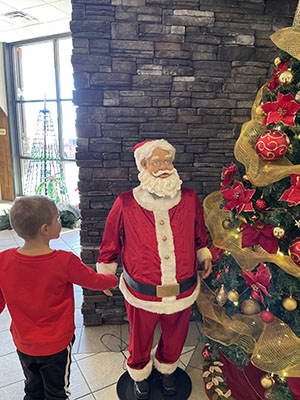 Next, you may catch Mommy Kissing Santa Claus. The holidays can be a time when we’re so busy caring about others, we forget to take care of ourselves. Caregiver burnout is a real thing! Remember to take time to care for yourself, hug those around you, and indulge in whatever your idea of self-care is. It may be having a quiet bubble bath, or simply getting a chance to read a new book, or even completing that puzzle you bought forever ago. Whatever it is, use that respite and take some time for yourself and your significant other. Next, you may catch Mommy Kissing Santa Claus. The holidays can be a time when we’re so busy caring about others, we forget to take care of ourselves. Caregiver burnout is a real thing! Remember to take time to care for yourself, hug those around you, and indulge in whatever your idea of self-care is. It may be having a quiet bubble bath, or simply getting a chance to read a new book, or even completing that puzzle you bought forever ago. Whatever it is, use that respite and take some time for yourself and your significant other.
Ultimately, it’s OK to have no place to go! Let it snow, let it snow, let it snow! Any holiday season can be overwhelming to any one of us. It is absolutely OK to say no to some of those invites and stay in.
|
|
|
Sensory Processing Challenges
Nicole Burnett
Our sensory system strives to maintain an optimal level of arousal, somewhere between too much sensory information and not enough sensory information. This optimal level allows us to stay alert and effectively process new incoming sensory information from our environment. However, this isn’t as easy as it sounds for ASD individuals. The sensory profiles of individuals with ASD are different than those of neurotypicals, especially for the auditory and touch senses. Over 90% of ASD individuals experience sensory differences; however, there are individual differences in what this looks like. Below I describe several ways in which an individual with ASD can experience their sensory world.
 Hypo-Responsivity – The individual is under-responsive to incoming information, meaning they need a lot of sensory stimulation to respond to stimuli. This individual may appear aloof, or possibly ignore others when spoken to. Because this individual doesn’t receive enough sensory stimulation, they may seek it out, engaging in self-stimulatory behaviours (i.e., “stimming”). Hypo-Responsivity – The individual is under-responsive to incoming information, meaning they need a lot of sensory stimulation to respond to stimuli. This individual may appear aloof, or possibly ignore others when spoken to. Because this individual doesn’t receive enough sensory stimulation, they may seek it out, engaging in self-stimulatory behaviours (i.e., “stimming”).
Hyper-Responsivity – The individual is very sensitive to incoming sensory information, meaning they can become overstimulated or overwhelmed very easily. The individual may avoid loud noises, dislike the feel of certain clothes or textures, and be a picky eater (food has textures, too!).
Sensory Processing Disorder – The individual experiences both hypo- and hyper-responsivity to their sensory environment. They may be sensory-seeking in some environments, and shut down or avoid others. It is important to note that sensory processing disorder is not officially considered a diagnosis, but rather a term used to describe sensory differences.
There are also other, less common challenges experienced by some ASD individuals. Here are some examples:
Mono-Processing – This is a sensory challenge in which one sense is activated or processed at a time. For example, if the person is listening to a song, then they won’t be processing what they see. These individuals often struggle with memory and social environments, and situations where multiple senses are required at the same time. Patience is key when working with these individuals, and don’t be afraid to repeat yourself.
Delayed Processing – This is a sensory challenge in which the individual processes sense information, but it just takes more time. For example, a child may not start their assignment right away after listening to the instructions because they are still processing what was said. Again, patience is key.
Synesthesia – This is a very unique sensory challenge that is more common in the ASD population compared to the neurotypical population (although still rare in both cases). Synesthesia is where the senses are blended, or the activation of one sense automatically activates another. For example, a certain sound may have a taste, or they may hear music when reading a story. This doesn’t pose much of a challenge for the individual, but you may hear them describe odd combinations of sense experiences. Although, they  may avoid situations where the sense information produces an uncomfortable combination for them. may avoid situations where the sense information produces an uncomfortable combination for them.
For all these sensory challenges, safety is a consideration and should be the first priority for any interventions. For example, the hypo-responsive individual’s sensory-seeking behaviour could lead to self-injury. The hyper-responsive individual’s escape behaviour could lead to them running into unsafe places (e.g., bodies of water), or into traffic. The delayed processor may not realize they have just seriously injured themselves (e.g., burning their hand and not processing the pain right away). And the mono-processor may not be aware of the sound of an approaching car in a parking lot when they were looking at a dog across the street. Keeping these safety concerns in mind, please have a safe and sensory-friendly Holiday Season.
Sincerely, Dr. Nicole Burnett
Dr. Burnett is a cognitive scientist and a psychology professor at Medicine Hat College.
|
|
|
Not PDD Qualified – Now What?
Kitty Parlby
In Alberta, the lion’s share of funding to support adults with developmental disabilities is provided through PDD (Persons with Developmental Disabilities). But that funding is only for those with an IQ of less than 70. That cut-off leaves many, who may still need some level of support, without funding. Even those considered ‘high-functioning’ often need support in certain areas.
 There are many places and organizations that have supportive services which are not strictly meant for those with disabilities. Many colleges and universities throughout the province have supports in place; try using the words ‘accessibility’ or ‘disability’ when searching on their websites. Likewise, many organizations, clubs and programs may be open to inclusivity, with a little knowledge imparted to them. There are many places and organizations that have supportive services which are not strictly meant for those with disabilities. Many colleges and universities throughout the province have supports in place; try using the words ‘accessibility’ or ‘disability’ when searching on their websites. Likewise, many organizations, clubs and programs may be open to inclusivity, with a little knowledge imparted to them.
I have endeavoured to put together a list (alphabetical) of programs and resources that do not require a person to be PDD funded. Some of them are for anyone to use, some of them are only for individuals with disabilities. Many of the programs have in-person options (only in their city) and virtual options for province-wide access. You’ll notice that I have left it up to you to delve into what these programs entail. I’ve given the name of the program, the location (if it's not already given in the title), the delivery method, and the webpage link.
Employment and Education
Autism CanTech – Norquest College
Boyle Street Education Centre (Edmonton)
Cosmos Disability Services:
YMCA of Northern Alberta:
Calgary Alternative Support Services – Employment Services
Disability Related Employment Supports/DRES (Alberta)
Employabilities:
EPSS (Employment Placement & Support Services) – Red Deer:
 Fifth on 5th Youth Services (Lethbridge, ages 15 – 30) Fifth on 5th Youth Services (Lethbridge, ages 15 – 30)
Grande Prairie Regional College: Accessibility Supports and Disability Services
Keyano College (Fort McMurray): Accessibility Services
Lethbridge College: Accessibility Services
MacEwan University (Edmonton): Access and Disability Resources
MentorAbility (Edmonton)
Norquest College (Edmonton): Transitions to Employment program
Olds College - Transitional Employment Program (Olds)
Red Deer Polytechnic: Accessibility Services
Southern Alberta Institute of Technology/SAIT (Calgary): Accessibility Services
Sinneave Family Foundation: (various delivery methods)
EmploymentWorks:
- You can choose one of three delivery methods; In-person in Calgary, virtual (instructor-led), or online (self-directed): https://employment-works.ca/
Society for Treatment of Autism (Calgary & Area)
Spectrum Advantage (Calgary)
Training Inc. (Lethbridge): STRIVE – Career Services and Employment Support
Voice of Albertans with Disabilities: (Multiple different bursaries available for education)
YMCA Medicine Hat – Employment Services (Connect Program)
Activity, Skills and Community Groups and Programs
Autism Aspergers Friendship Society of Calgary – Go Group
Blue Fox Association (Lethbridge)
Centre For Autism Services: Edmonton and area
Cosmos Disability Services: Red Deer and Area
 EPSS (Employment Placement & Support Services): Red Deer and Central Alberta Building Our Stronger Selves EPSS (Employment Placement & Support Services): Red Deer and Central Alberta Building Our Stronger Selves
Nina Haggerty Centre for the Arts: Edmonton and area
Rehabilitation Society of Calgary
Rocky Mountain Adaptive (Alberta)
This is only a small sample of what you may find. With a bit of research, advocacy, and perseverance, you can create your own opportunities. Check out the YMCA, your local library, and the Family & Community Support Services (FCSS) office in your area. Don’t be shy to investigate clubs, organizations, activities and programs that interest you. Tell the organizers about yourself and what support you or your autistic loved one may need to participate. You could be the first person with a developmental disability that has approached them. Think of what inroads you might make for yourself and others to come. Your inquiry and willingness to be open could be the start of something terrific. GO FOR IT!
Kitty Parlby is the mother of an autistic young adult. She is a former special needs Educational Assistant and an autism speaker and consultant with Autism Inspirations. She currently also works as a Family Resource Coordinator for Autism Society Alberta.
|
|
|
A Letter to My Boy
Carina Moran
Today was a hard day, buddy.
Being atypical means you don’t exactly run with the pack. You have always forged your own path. Truthfully, it’s how you’ve always been. How you were born to be. I admire you so greatly in how you handle this. You are so brave. But I also know, deep down, how lonely it can be for you. Friendships are hard when you’re on the spectrum.
 To kids your age, you are often seen as “weird”. You are the brother that no one quite “gets”, who no one wants to play with, and often the last one picked for things. They see you as different. A square peg in a world of round holes. They don’t know how to make you “fit”. You aren’t typical. To kids your age, you are often seen as “weird”. You are the brother that no one quite “gets”, who no one wants to play with, and often the last one picked for things. They see you as different. A square peg in a world of round holes. They don’t know how to make you “fit”. You aren’t typical.
The world is a tough place right now when you’re 8 years old. At this stage of the game, hanging out with friends and feeling accepted is of the utmost importance for any growing boy. BUT, I’m going to let you in on a little secret. As you mature and truly become comfortable in who you are and who God made you to be, the world is going to begin to see you differently. They will see you as the artist, the intellectual, and the brilliant little mind that I know you to be. How do I know this? How can I be so certain? Because YOU, my dear boy, will change the world.
And when you are responsible for disrupting the typical way of doing things, who can’t help but notice?!
Can you imagine how stuck all of us would be as a civilization if we didn’t have minds like yours to take the ball and move it forwards? Plenty have grabbed that ball and ran yards with it before you – and guess what, they were all atypical too. Albert Einstein, Steve Jobs, Beethoven, Mozart, Pablo Picasso and Bill Gates, to name a few.
But you don’t need recognition, approval or applause. Because your identity and strength come from a far deeper place. It is through your struggles right now that you are finding that.
Consider it pure joy, my son, whenever you face trials of many kinds; because you know that the testing of your faith produces perseverance. Let perseverance finish its work so that you may be mature and complete, not lacking anything.
Some people go their whole lives never, ever learning that. And to imagine you have this wisdom at 8!
 You also have a heck of a lot of knowledge about black holes and a strange understanding about theoretical physics and the space/time continuum. You also have a wicked slap shot and can throw a baseball freakishly far. You are a lot of things. Know a lot of things. But most of all, you are MY boy. And I thank God every second of every day that He gifted ME with the incredible honour of raising YOU. I don’t know what I did to receive such a blessing. I am not perfect, buddy – not as smart as you, not as gifted, not as gentle, not as aware. But I promise you one thing. I’ll always have your back. And I’ll always be here to navigate this crazy world with you as your co-pilot. Maverick and Goose. You and Me. You also have a heck of a lot of knowledge about black holes and a strange understanding about theoretical physics and the space/time continuum. You also have a wicked slap shot and can throw a baseball freakishly far. You are a lot of things. Know a lot of things. But most of all, you are MY boy. And I thank God every second of every day that He gifted ME with the incredible honour of raising YOU. I don’t know what I did to receive such a blessing. I am not perfect, buddy – not as smart as you, not as gifted, not as gentle, not as aware. But I promise you one thing. I’ll always have your back. And I’ll always be here to navigate this crazy world with you as your co-pilot. Maverick and Goose. You and Me.
Always and Forever.
|
|
|
Antecedent-Based Interventions (ABI)
Carmen Moore
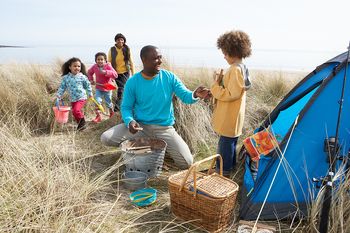 This month, I plan to highlight the evidence-based practice (EBP) of Antecedent-Based Interventions (ABI). ABI is a shorter way of saying, “Let’s try to set the stage for success as much as we possibly can, and sidestep any potential issues before they happen”. For example, if you are going camping, there is so much work that goes into a successful camping trip that happens before you ever pull out of the driveway. You try to anticipate so much of what everyone will need, to make the trip fun and enjoyable. ABI is a bit like that: trying to think of everything you might need to make the experience a positive one, by anticipating all the possible needs of the learner. This month, I plan to highlight the evidence-based practice (EBP) of Antecedent-Based Interventions (ABI). ABI is a shorter way of saying, “Let’s try to set the stage for success as much as we possibly can, and sidestep any potential issues before they happen”. For example, if you are going camping, there is so much work that goes into a successful camping trip that happens before you ever pull out of the driveway. You try to anticipate so much of what everyone will need, to make the trip fun and enjoyable. ABI is a bit like that: trying to think of everything you might need to make the experience a positive one, by anticipating all the possible needs of the learner.
Have you ever tried a new (or familiar) activity, gone to a place or simply attended an event, had it be somewhat of a flop, and thought to yourself, “Well, I knew that was going to happen! Why did I even try that?” I have had that happen to me. We can, and oftentimes do, predict that something will result in a problem (meltdown, non-compliance, social issue, sensory issue, etc.) before we even set out to do it. Afterwards, we may feel defeated once again. We had hoped that by some chance, this time, it would be different or better. For instance, birthday parties used to be a big ‘issue’ for our family. Before we even left the house, I was fairly certain that my child would be very upset while everyone sang ‘happy birthday’ at that inevitable part of the party. I would try to calm him down, or have to take him out of the room during the festive song. On one occasion, the reaction was so severe that we even had to leave the party. I could have predicted it, but blindly hoped that this time the response would be fine. It wasn’t. That began to change when I started 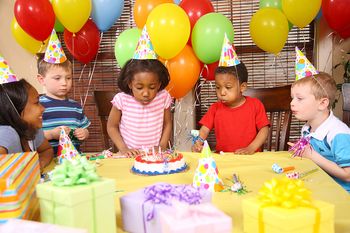 using ABI - setting the stage for success (in conjunction with other EBP’s if needed; for example, reinforce afterwards). using ABI - setting the stage for success (in conjunction with other EBP’s if needed; for example, reinforce afterwards).
Let us look at what the words in this EBP mean. ‘Antecedent’ can be defined as an environmental condition, social expectation, stimulus, event, or school demand, which occurs immediately before a challenging behaviour. For instance, it can be one thing (ex: a loud noise) or several things combined (loud noises, large crowds, hot weather, etc.). It can be a person, place, activity or demand. Honestly, it can even be the lack of a stimulus (ex: visual schedule missing and the learner feeling lost). An ABI is a proactive strategy, put in place to reduce problematic behaviour, and increase engagement/on-task behaviours. Oftentimes, the best strategies are ones that help create the environment that will prevent the behaviour from happening in the first place. Another analogy can be to think of playing defense as opposed to offense all the time.
It can be some effort to try to anticipate what may result in an issue, but here are some questions that may help. Take a mental photograph of the following:
- Where did the behaviour occur?
- Who was present?
- What was asked of the individual?
- At what time of day did it occur?
- What was the individual experiencing just prior to the issue?
Some families have issues with supporting their family member through successful dentist visits. This used to be a terrible experience for all of us! Our son would be so upset, and would be desperately trying to get out of the dentist chair. We were just trying to get as close to a good checkup as possible. I felt badly for the staff, who were so wonderful and trying their best to do a good job.
 I started to research some strategies that we could put in place before a dental visit occurred. One thing I did was have him start to watch YouTube videos of children going to the dentist office who were having an enjoyable time. I also asked the dentist for items that I could use to ‘play dentist’ at home with him. I tried to make it into a game. I offered a very special reinforcement for when we would be done with the visit. The dentist allowed me to come once a month for five minutes, just to have our son sit in the dentist chair, have it move up and down, joke with the staff, get a prize, and leave with a smile. I also gave him a fidget for his hands, to use when he was in the chair. I took a little video of him enjoying the mini-dentist visit and he could watch it regularly. This was, admittedly, a LOT of work, but now we have no issue at all at the dentist, and when he does need to have ‘actual dentist work’ done, he is calm enough for them to do their work without the meltdowns we used to experience. I was very grateful to the dental staff who helped these ABIs to be successful. I started to research some strategies that we could put in place before a dental visit occurred. One thing I did was have him start to watch YouTube videos of children going to the dentist office who were having an enjoyable time. I also asked the dentist for items that I could use to ‘play dentist’ at home with him. I tried to make it into a game. I offered a very special reinforcement for when we would be done with the visit. The dentist allowed me to come once a month for five minutes, just to have our son sit in the dentist chair, have it move up and down, joke with the staff, get a prize, and leave with a smile. I also gave him a fidget for his hands, to use when he was in the chair. I took a little video of him enjoying the mini-dentist visit and he could watch it regularly. This was, admittedly, a LOT of work, but now we have no issue at all at the dentist, and when he does need to have ‘actual dentist work’ done, he is calm enough for them to do their work without the meltdowns we used to experience. I was very grateful to the dental staff who helped these ABIs to be successful.
If you are interested in checking out the free online AFIRM modules, here is the link to the ABI module, and here is the link to the whole series.
|
|
|
Keeping Santa Simple
Karla Power
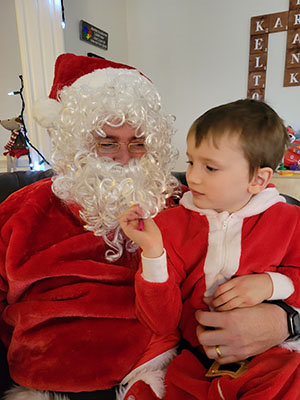 Everyone loves to talk about the magic of Christmas, but in our house, we tend to keep things status quo with just a sprinkling of magic, so as to not disturb the boys’ routine and create unnecessary stress for our family. Don’t get me wrong: we still put up a tree, listen to Christmas music and do all the things. We have just found ways to do them in our own way, so that they are more enjoyable for the boys and us. Everyone loves to talk about the magic of Christmas, but in our house, we tend to keep things status quo with just a sprinkling of magic, so as to not disturb the boys’ routine and create unnecessary stress for our family. Don’t get me wrong: we still put up a tree, listen to Christmas music and do all the things. We have just found ways to do them in our own way, so that they are more enjoyable for the boys and us.
This year, we have really learned to enjoy Santa in a few new ways. We are fortunate to live in a place that thinks outside the box, and for the past two years, we have been able to attend a drive-thru Santa Claus parade, as well as a fundraiser for our hospital called Bright Lights. Lots of people seem disappointed that we are still unable to attend these fun events in person, but for our family, it is perfect! We are able to attend these events from the comfort and safety of our nice warm vehicle. This year, Autism RMWB (Regional Municipality of Wood Buffalo) even offered sensory-friendly time slots for families who wanted to enjoy the Santa Claus parade with less noise and blinking lights.
At the Bright Lights event, we were fortunate to experience some of the magic that we hear other families speak of. At the end of the drive-thru light display were Santa and Mrs. Claus, waving at cars. As Santa approached Paddy’s open window, I glanced back, and to my amazement, Paddy was making eye contact with Santa, smiling and even gave him a high five! Of course, I didn’t have my camera ready, so I asked Santa to do it again, and caught the magical moment on camera. We will forever cherish this memory of our 6-year-old showing an interest in Santa for the very first time!
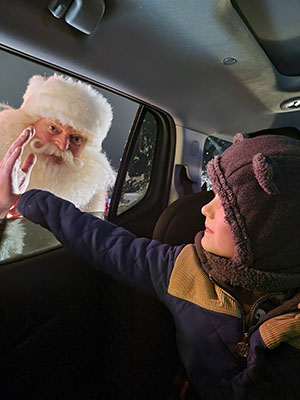 One other way our family has decided to keep Santa simple is by having him “visit” us in our home. In fact, he lives here! A few weeks ago, my husband was holding Kelton on his lap, and I exclaimed, “I wish you were wearing a Santa suit because this would be a perfect picture!”. The next day, my husband ordered a big red suit, and we were able to have a little Santa photoshoot from the comfort of our home, without having to wait in line or be in a busy and overwhelming place. One other way our family has decided to keep Santa simple is by having him “visit” us in our home. In fact, he lives here! A few weeks ago, my husband was holding Kelton on his lap, and I exclaimed, “I wish you were wearing a Santa suit because this would be a perfect picture!”. The next day, my husband ordered a big red suit, and we were able to have a little Santa photoshoot from the comfort of our home, without having to wait in line or be in a busy and overwhelming place.
By making these accommodations for our boys around the holidays, we have really lessened the stress level of everyone and added enjoyment to these special occasions. We are still learning how to have a balance of magic and calmness, as we can’t have one without the other. For now, we will continue to give our boys opportunities to enjoy the holidays, but remember to keep them simple and stress-free.
|
|
|
Children's Autism Services of Edmonton – 14th Annual Autism Conference

Children’s Autism Services of Edmonton invites you to join us for their 14th Annual Autism Conference on January 21-22, 2022.
We are going virtual, taking advantage of this opportunity to bring some amazing speakers to you through distance technology. You will be able to access the conference from anywhere, and engage with the speakers and other attendees.
Speakers include: Faith Cole, Paula Kluth, Michael John Carley, Grant Bruno, and more!
This year’s topics include parenting, diversity, and inclusion. The event will showcase important tools, resources, and strategies for education and health care professionals, as well as families and their children in our community.
For more information and to register, please visit www.caseconf.ca
|
|
|
End article-->
Centre for Autism Services Alberta
Programs for the New Year
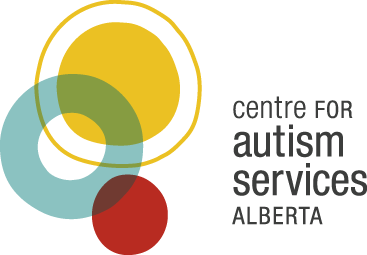
We have exciting programs for the New Year!
Thinking about getting a job? Need a boost to get started? Our EmploymentWorks Canada program offers employment preparedness training and job sampling work experience for individuals who have been diagnosed with a disability, including but not limited to ASD. With in-person, online, and hybrid streams available, there’s an option that suits YOU! To inquire and to register, send us an email at Employment Works. Our in-person winter cohort starts up January 5th, so don’t delay!
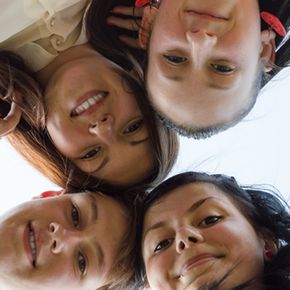 Making and keeping friends can be hard for everyone, but it can be especially challenging for teens with autism. That’s where PEERS for Teens comes in. Registration for the PEERS for Teens program is ongoing. Our winter cohort starts January 11 and runs once a week on Tuesday evenings for 14 weeks. For more information and to register, visit the Centre for Autism Services Alberta website. Making and keeping friends can be hard for everyone, but it can be especially challenging for teens with autism. That’s where PEERS for Teens comes in. Registration for the PEERS for Teens program is ongoing. Our winter cohort starts January 11 and runs once a week on Tuesday evenings for 14 weeks. For more information and to register, visit the Centre for Autism Services Alberta website.
Friendship and relationship-building can present a particular challenge for adults with ASD. That’s where PEERS for Adults comes in. Registration for the PEERS for Adults program is ongoing. Our in-person winter cohort starts January 12 and runs once a week on Wednesday evenings for 16 weeks. For more information and to register, visit the Centre for Autism Services Alberta website.
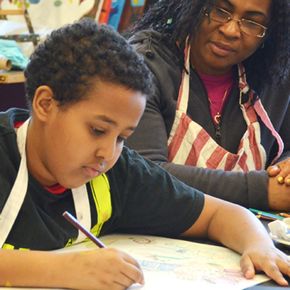 Hey there, creative kiddos! Our Fun with Art program, for children ages 6-12 with ASD, is back up and running at the Nina Haggerty Centre for the Arts in Edmonton. Registration for Winter programming is now open! Spaces are limited, so register today! For more information and to register for Fun with Art, click here. For information on our other programs for children, teens, and adults, click here. Hey there, creative kiddos! Our Fun with Art program, for children ages 6-12 with ASD, is back up and running at the Nina Haggerty Centre for the Arts in Edmonton. Registration for Winter programming is now open! Spaces are limited, so register today! For more information and to register for Fun with Art, click here. For information on our other programs for children, teens, and adults, click here.
|
|
|
End article-->
Family Resource Centres' New Website
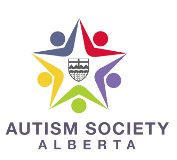
Autism Alberta's Family Resource Centres have a brand new website! Find resources in your local area, as well as contact information for all our Family Resource Coordinators. There's also a community calendar with support groups, events, workshops, presentations and more! Scan the QR code in the image or go here.
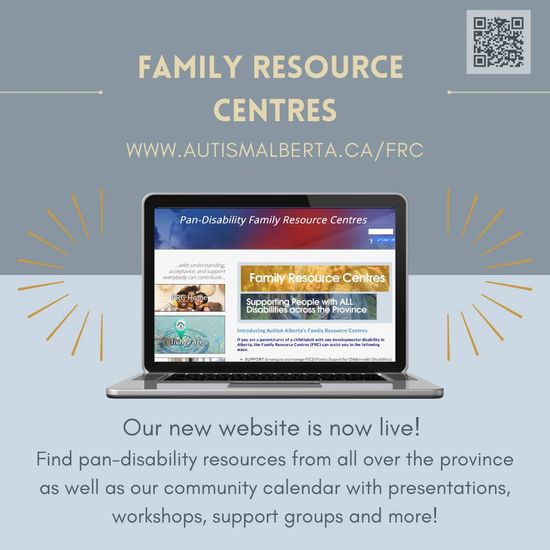
|
|
|
End article-->
Register Now for Spectrum Advantage

Spectrum Advantage is a 16-week employability skills initiative that helps young autistic professionals get and keep appropriate employment to their skills and training. To find out more and to register, go to The Spectrum Advantage. Classes start on January 17th.

|
|
|
End article-->
St. Paul's FRC – Amy Noel

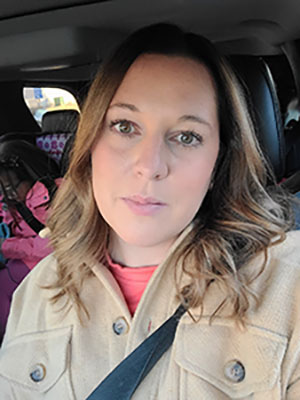 Amy Noel is the Family Resource Coordinator located in St. Paul, Alberta. To learn all about Amy, check out the video she made - St. Paul's FRC Amy Noel. Amy Noel is the Family Resource Coordinator located in St. Paul, Alberta. To learn all about Amy, check out the video she made - St. Paul's FRC Amy Noel.
|
|
|
End article-->
Merry Christmas and Happy Holidays!
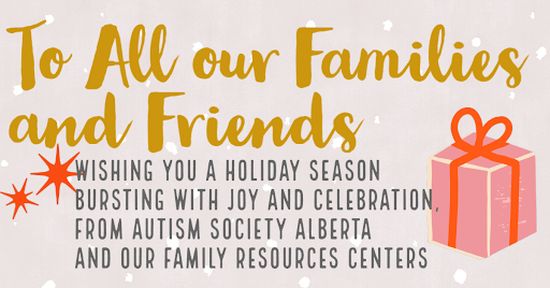
|
|
|
End article--> |
|